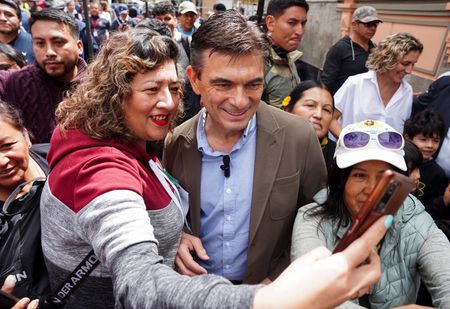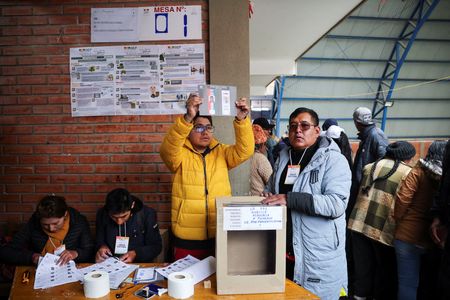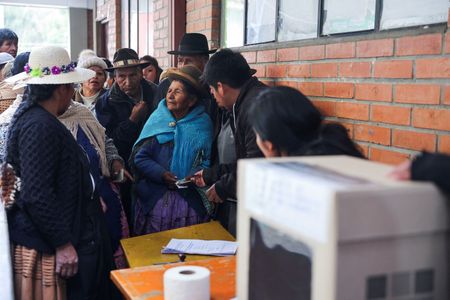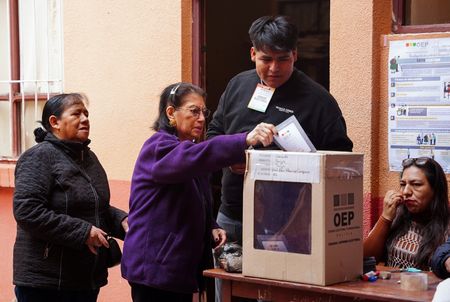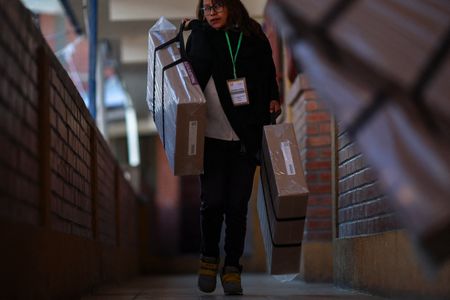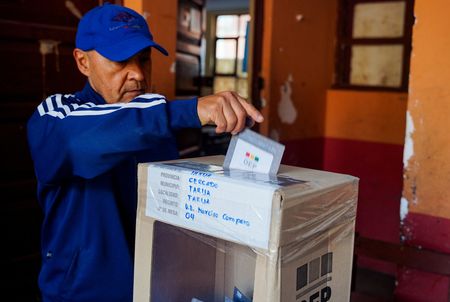By Lucinda Elliott and Monica Machicao
LA PAZ (Reuters) -Polls in Bolivia closed on Sunday and voters awaited the results of a presidential runoff that marks a decisive rejection of the socialist government and a likely foreign policy shift toward the United States after decades of frosty relations.
Initial results are expected after 9 p.m. (0100 GMT).
The race pits centrist Senator Rodrigo Paz against conservative former president Jorge "Tuto" Quiroga. Both candidates have pledged to strengthen diplomatic ties with Washington — strained since 2009 — and seek U.S.-backed financial support to stabilize Bolivia's fragile economy.
The runoff between two pro-market candidates from privileged backgrounds signals an epochal shift for Bolivia, following two decades of dominance by the leftist Movement to Socialism party, founded by Evo Morales and once backed by the country's Indigenous majority.
Electoral observers from the Organization of American States (OAS) said the vote proceeded normally on Sunday. The winner will take office on November 8.
For some voters the finalists echo the conservative governments of the 1990s, which championed privatization and close relations with the United States. Morales, who took power in 2006 and was Bolivia's first Indigenous leader, pursued alliances with Cuba, Venezuela and Russia, and nationalized the oil and gas industry.
"This election marks a political turning point," said Glaeldys Gonzalez Calanche, analyst for the Southern Andes at International Crisis Group. Regardless of the outcome, "Bolivia is heading in a new direction," she said.
Quiroga has promised "radical change," including deep cuts to public spending and closing or privatizing loss-making state-owned companies. Paz favors a more gradual approach, maintaining social programs for the poor while promoting private-sector growth.
Opinion polls show Quiroga with a narrow lead. A September Ipsos survey gave him 47% support to Paz's 39%, though Paz outperformed expectations in the August first round.
VOTERS WANT ECONOMIC CHANGE
Paz in late September announced plans for an economic cooperation deal worth $1.5 billion with U.S. officials to ensure fuel supplies, while Quiroga is pushing for a $12 billion international bailout backed by multilateral lenders.
U.S. Secretary of State Marco Rubio said this week that both presidential candidates "want stronger, better relations with the United States," after decades of anti-American leadership. "This election is a transformative opportunity," he said on Wednesday.
Some Bolivians have voiced fears of austerity measures such as those seen in neighboring Argentina under President Javier Milei, though Paz has rejected drastic spending cuts and Quiroga insists his policies will benefit ordinary Bolivians.
Support for the Movement to Socialism all but collapsed in the election's first round.
Inflation has surged to 23% since the start of the year, while fuel and dollar shortages have crippled consumer demand. Natural gas exports - once Bolivia's economic engine - have plummeted, straining the boliviano currency and limiting fuel imports.
In La Paz's commercial district, appliance stores are shuttered and shops empty of customers.
"There are months with zero sales," said Mercedes Quisbert, head of the local Importers' Association. Up until this year, shopkeepers and street-sellers had been just about managing to weather the crisis, she said - but not anymore.
Bolivia has one of Latin America's highest rates of informal employment, with around 84% of the population working outside the formal labor market, according to official data. Millions rely on buying and selling goods to make a living.
"We're basically surviving," said Marcela Martinez, 52, as she compared prices at a market in La Paz. She was planning to vote for Paz on Sunday. "We need new people to come in."
(Reporting by Lucinda Elliott in Montevideo and Monica Machicao and Daniel Ramos in La Paz; Additional reporting by Diego Delgado in La Paz; Editing by Rosalba O'Brien, Nia Williams and Deepa Babington)


